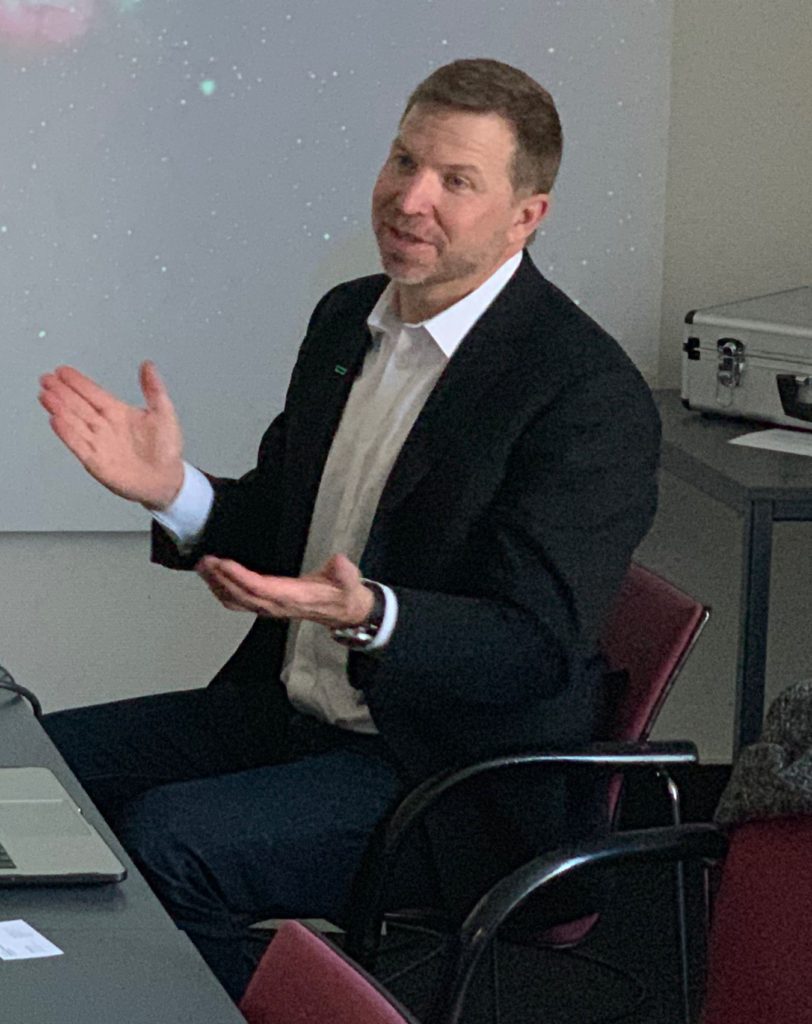I’m at Hannover Messe 2019 for the first time, courtesy of Hewlett Packard Enterprise. It’s not as big as CeBIT was, but it is still a huge conference with over 20 halls of exhibitors, covering everything from Industry 4.0, integrated automation, the digital factory, industrial supply, research & technology to the digital workplace. HPE are in hall 6, the home of digital manufacturing. I’ll be telling more stories from here around AI, automation, IoT, edge computing and a whole lot more, but on the first day I met with Chris Wellise HPE’s Chief Sustainability Officer.

When I’m speaking at events I’ll often ask the audience who amongst them was born on or before 1974, because those of us that were have been alive while the population of the planet has doubled, and as humans have been around for 200,000 years, that rate of change is staggering. We live in exponential times, and Chris is full of eye-watering quotes and statistics on a topic that ins’t particularly sexy, but our lives and the future depends on it. Chris says that as a large scale manufacturer:
“HPE produces 7 servers, 13 networking devices and 80 TB of storage every 60 seconds!”
That’s 5 million units a year, all which generate data, and all of which need energy and resources in their creation. Chris suggests that by 2030 most people will have 15 devices, all generating data because “everything computes at the edge and everywhere”. He’s seen research that suggests we will run out of gold by 2030. Yikes!
You don’t have to have watched The Blue Planet to recognise the effect of what we are creating and then throwing away is doing for all of our futures. Chris believes that sustainability is key. We have to power the digital economy in a new way, and recognise the energy and resource constraints we need to work around. Chris believes we have to move towards the circular economy. To be able to do more with less. We have to think in terms of applying our technology to disrupt the status quo. We need smart manufacturing approaches to remove resource leakages.
HPE have been rethinking design for environment since late 80s and they are one of only a few tech companies who regularly talk about what they are doing and why, rather than it just being a topic in the corporate social responsibility section of the website. This thinking is necessary as the numbers are so big. There will be 8.5 billion of us by 2030. We’ll have 21 billion devices connected and sharing data by 2020. By 2060 we will be need to be extracting twice the raw material that we do today, unless we can think differently. We are running out of our planet at the same time that some people don’t even accept that global warming is real.
The HPE approach is to think through every product and design for its end of use. They can “upcycle” and reconfigure equipment for a new customer within 48 hours at their renewable technology centres in Erskine, Scotland, and Andover, Massachusetts. The products are, on average, 89% remanufactured to be sent on to a new customer with the remaining 11% responsibly recycled. HPE have a vast shared supply chain servicing more than 150,000 customers, helped by over 170 suppliers, and then delivering products to 140 countries. Chris says that they think about how they can have a sustainable influence on that massive supply chain in terms of greenhouse gas targets connected to the science of what they are doing, all in line with the Paris Accord on climate change. It’s a call to action for our industry. The current trajectory we are on is not sustainable.
The other concept Chris talks about is “data landfill”. He suggest that only 6% of data we generate is actually being used, and so the other 94% is wasted data that we have used energy, raw materials and production capacity to generate (for no added value). How do we close that gap?
Here’s Chris at the show following our sit down, talking with me some more around the sustainability topic:
I’ll carry on the discussion in a follow on post, taking the sustainability thinking through to HPE’s customers using IoT, AI and data analytics technology to change the dynamic and reduce the waste. Like I said at the start, sustainability might not be a sexy topic, but our future depends on it!
Check back here for more content like this, and contact us if you want to find out more.
Disclosure: HPE paid my expenses for the trip to HMI 2019 as part of their influencer programme.
